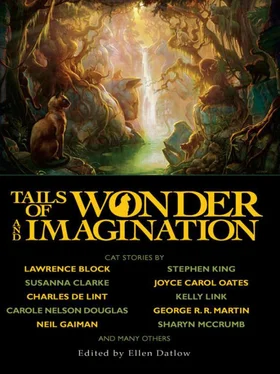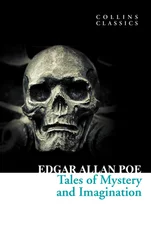Ellen Datlow - Tails of Wonder and Imagination
Здесь есть возможность читать онлайн «Ellen Datlow - Tails of Wonder and Imagination» весь текст электронной книги совершенно бесплатно (целиком полную версию без сокращений). В некоторых случаях можно слушать аудио, скачать через торрент в формате fb2 и присутствует краткое содержание. Год выпуска: 2010, ISBN: 2010, Издательство: Night Shade Books, Жанр: Фэнтези, Фантастика и фэнтези, Ужасы и Мистика, на английском языке. Описание произведения, (предисловие) а так же отзывы посетителей доступны на портале библиотеки ЛибКат.
- Название:Tails of Wonder and Imagination
- Автор:
- Издательство:Night Shade Books
- Жанр:
- Год:2010
- ISBN:978-1-59780-170-6
- Рейтинг книги:5 / 5. Голосов: 1
-
Избранное:Добавить в избранное
- Отзывы:
-
Ваша оценка:
- 100
- 1
- 2
- 3
- 4
- 5
Tails of Wonder and Imagination: краткое содержание, описание и аннотация
Предлагаем к чтению аннотацию, описание, краткое содержание или предисловие (зависит от того, что написал сам автор книги «Tails of Wonder and Imagination»). Если вы не нашли необходимую информацию о книге — напишите в комментариях, мы постараемся отыскать её.
collects the best of the last thirty years of science fiction and fantasy stories about cats from an all-star list of contributors.
Tails of Wonder and Imagination — читать онлайн бесплатно полную книгу (весь текст) целиком
Ниже представлен текст книги, разбитый по страницам. Система сохранения места последней прочитанной страницы, позволяет с удобством читать онлайн бесплатно книгу «Tails of Wonder and Imagination», без необходимости каждый раз заново искать на чём Вы остановились. Поставьте закладку, и сможете в любой момент перейти на страницу, на которой закончили чтение.
Интервал:
Закладка:
Julius Muir was of slender build, with deep-set, somber eyes of no distinctive color; thinning, graying, baby-fine hair; and a narrow, lined face to which the adjective lapidary had once been applied, with no vulgar invention of mere flattery. Being of old American stock he was susceptible to none of the fashionable tugs and sways of “identity”: He knew who he was, who his ancestors were, and thought the subject of no great interest. His studies both in America and abroad had been undertaken with a dilettante’s rather than a scholar’s pleasure, but he would not have wished to make too much of them. Life, after all, is a man’s primary study.
Fluent in several languages, Mr. Muir had a habit of phrasing his words with inordinate care, as if he were translating them into a common vernacular. He carried himself with an air of discreet self-consciousness that had nothing in it of vanity, or pride, yet did not bespeak a pointless humility. He was a collector (primarily of rare books and coins), but he was certainly not an obsessive collector; he looked upon the fanaticism of certain of his fellows with a bemused disdain. So his quickly blossoming hatred for his wife’s beautiful white cat surprised him, and for a time amused him. Or did it frighten him? Certainly he didn’t know what to make of it!
The animosity began as an innocent sort of domestic irritation, a half-conscious sense that being so respected in public—so recognized as the person of quality and importance he assuredly was—he should warrant that sort of treatment at home. Not that he was naively ignorant of the fact that cats have a way of making their preferences known that lacks the subtlety and tact devised by human beings. But as the cat grew older and more spoiled and ever more choosy it became evident that she did not, for affection, choose him. Alissa was her favorite, of course; then one or another of the help; but it was not uncommon for a stranger, visiting the Muirs for the first time, to win or to appear to win Miranda’s capricious heart. “Miranda! Come here!” Mr. Muir might call—gently enough, yet forcibly, treating the animal in fact with a silly sort of deference—but at such times Miranda was likely to regard him with indifferent, unblinking eyes and make no move in his direction. What a fool, she seemed to be saying, to court someone who cares so little for you!
If he tried to lift her in his arms—if he tried, with a show of playfulness, to subdue her—in true cat fashion she struggled to get down with as much violence as if a stranger had seized her. Once as she squirmed out of his grasp, she accidentally raked the back of his hand and drew blood that left a faint stain on the sleeve of his dinner jacket. “Julius, dear, are you hurt?” Alissa asked. “Not at all,” Mr. Muir said, dabbing at the scratches with a handkerchief. “I think Miranda is excited because of the company,” Alissa said. “You know how sensitive she is.” “Indeed I do,” Mr. Muir said mildly, winking at their guests. But a pulse beat hard in his head and he was thinking he would like to strangle the cat with his bare hands—were he the kind of man who was capable of such an act.
More annoying still was the routine nature of the cat’s aversion to him. When he and Alissa sat together in the evening, reading, each at an end of their sofa, Miranda would frequently leap unbidden into Alissa’s lap—but shrink fastidiously from Mr. Muir’s very touch. He professed to be hurt. He professed to be amused. “I’m afraid Miranda doesn’t like me any longer,” he said sadly. (Though in truth he could no longer remember if there’d been a time the creature had liked him. When she’d been a kitten, perhaps, and utterly indiscriminate in her affections?) Alissa laughed and said apologetically, “Of course she likes you, Julius,” as the car purred loudly and sensuously in her lap. “But—you know how cats are.”
“Indeed, I am learning,” Mr. Muir said with a stiff little smile.
And he felt he was learning—something to which he could give no name.
What first gave him the idea—the fancy, really—of killing Miranda, he could not have afterward said. One day, watching her rubbing about the ankles of a director-friend of his wife’s, observing how wantonly she presented herself to an admiring little circle of guests (even people with a general aversion to cats could not resist exclaiming over Miranda—petting her, scratching her behind the ears, cooing over her like idiots), Mr. Muir found himself thinking that, as he had brought the cat into his household of his own volition and had paid a fair amount of money for her, she was his to dispose of as he wished. It was true that the full-blooded Persian was one of the prize possessions of the household—a household in which possessions were not acquired casually or cheaply—and it was true that Alissa adored her. But ultimately she belonged to Mr. Muir. And he alone had the power of life or death over her, did he not?
“What a beautiful animal! Is it a male or a female!”
Mr. Muir was being addressed by one of his guests (in truth, one of Alissa’s guests; since returning to her theatrical career she had a new, wide, rather promiscuous circle of acquaintances) and for a moment he could not think how to answer. The question lodged deep in him as if it were a riddle: Is it a male or a female?
“Female, of course,” Mr. Muir said pleasantly. “Its name after all is Miranda.”
He wondered: Should he wait until Alissa began rehearsals for her new play—or should he act quickly, before his resolution faded? Alissa, a minor but well-regarded actress, was to be an understudy for the female lead in a Broadway play opening in September.) And how should he do it? He could not strangle the cat—could not bring himself to act with such direct and unmitigated brutality—nor was it likely that he could run over her, as if accidentally, with the car. (Though that would have been fortuitous, indeed.) One midsummer evening when sly, silky Miranda insinuated herself onto the lap of Alissa’s new friend Alban (actor, writer, director; his talents were evidently lavish) the conversation turned to notorious murder cases—to poisons—and Mr. Muir thought simply, Of course. Poison.
Next morning he poked about in the gardener’s shed and found the remains of a ten-pound sack of grainy white “rodent” poison. The previous autumn they’d had a serious problem with mice, and their gardener had set out poison traps in the attic and basement of the house. (With excellent results, Mr. Muir surmised. At any rate, the mice had certainly disappeared.) What was ingenious about the poison was that it induced extreme thirst—so that after having devoured the bait the poisoned creature was driven to seek water, leaving the house and dying outside. Whether the poison was “merciful” or not, Mr. Muir did not know.
He was able to take advantage of the servants’ Sunday night off—for as it turned out, though rehearsals for her play had not yet begun, Alissa was spending several days in the city. So Mr. Muir himself fed Miranda in a corner of the kitchen where she customarily ate—having mashed a generous teaspoon of the poison in with her usual food. (How spoiled the creature was! From the very first, when she was a seven-weeks’ kitten, Miranda had been fed a special high-protein, high-vitamin cat food, supplemented by raw chopped liver, chicken giblets, and God knows what all else. Though as he ruefully had to admit, Mr. Muir had had a hand in spoiling her, too.)
Miranda ate the food with her usual finicky greed, not at all conscious of, or grateful for, her master’s presence. He might have been one of the servants; he might have been no one at all. If she sensed something out of the ordinary—the fact that her water dish was taken away and not returned, for instance—like a true aristocrat she gave no sign. Had there ever been any creature of his acquaintance, human or otherwise, so supremely complacent as this white Persian cat.
Читать дальшеИнтервал:
Закладка:
Похожие книги на «Tails of Wonder and Imagination»
Представляем Вашему вниманию похожие книги на «Tails of Wonder and Imagination» списком для выбора. Мы отобрали схожую по названию и смыслу литературу в надежде предоставить читателям больше вариантов отыскать новые, интересные, ещё непрочитанные произведения.
Обсуждение, отзывы о книге «Tails of Wonder and Imagination» и просто собственные мнения читателей. Оставьте ваши комментарии, напишите, что Вы думаете о произведении, его смысле или главных героях. Укажите что конкретно понравилось, а что нет, и почему Вы так считаете.












